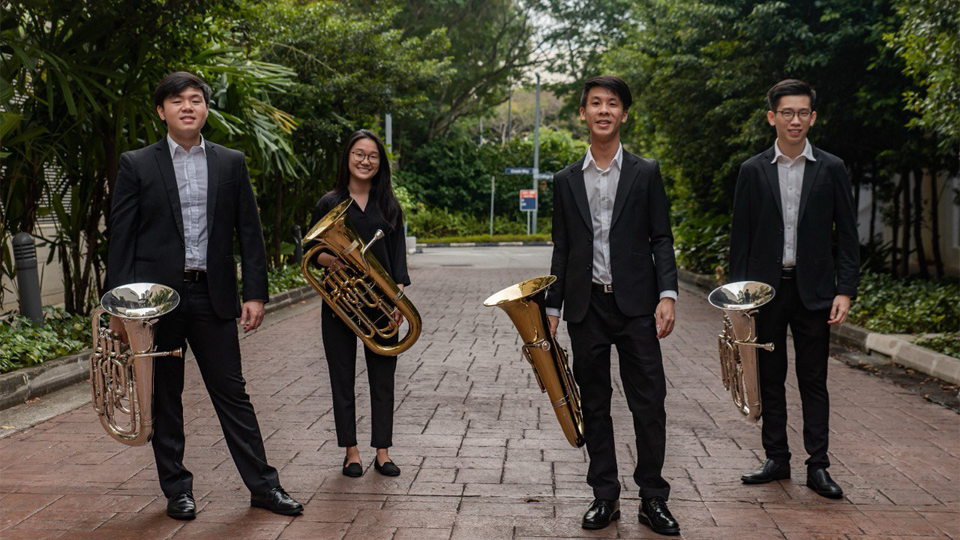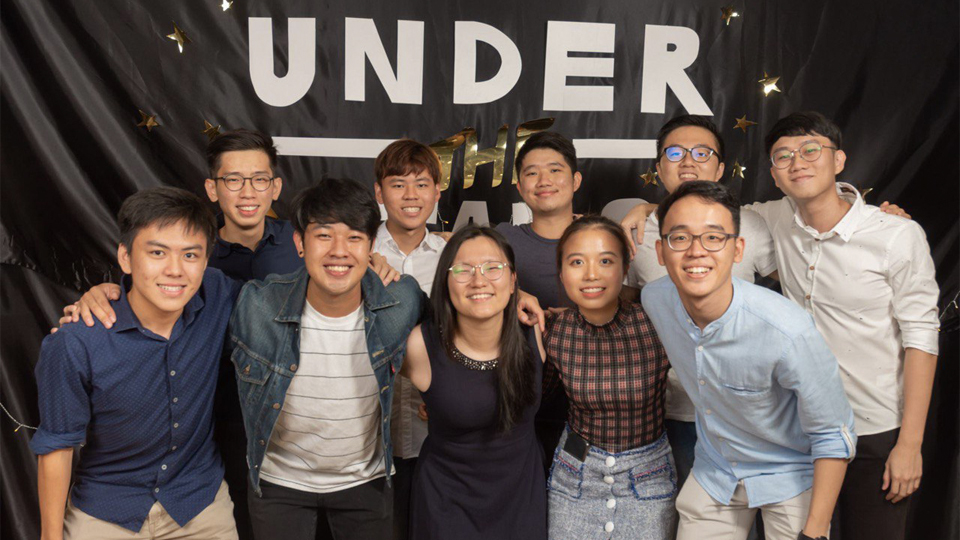Cells at work
Chin Sze Khen’s name card only reads “Cellular Agriculture”. To this, the NUS Faculty of Science alumnus has an interesting anecdote to offer. “Our boss decided to do away with all job titles within the company. Instead, our business cards only carry our work function. This is because ants have very minimal hierarchical structure — they innovate together on the ground,” he explains, alluding to the startup’s name: Ants Innovate Pte Ltd.
Sze Khen, who majored in Life Sciences, has been working at the biotechnology startup for the past year in cellular agriculture work, handling cell-line optimisation, facility design, and product development. There, he also builds up soft skills to meet the dynamic needs of any new company: “Ants Innovate helps to amplify my strengths of time management and problem-solving, because as a start-up we are faced with new problems to solve daily,” he adds.
Incidentally, Sze Khen’s journey with Ants Innovate began when he was an NUS Science undergraduate living in King Edward VII (KE7) Hall.
Evolving passions
Sze Khen’s passion for biology bloomed when he was a young boy in secondary school. He first chanced upon the YouTube animation channel Kurzgesagt — In a Nutshell. “I stumbled upon this particular video that blew me away by using simple layman terms to explain the biology of our human immunity system. Even my teachers could not explain these concepts as well as the channel did,” he recounts enthusiastically.
Initially, Sze Khen did not think his grades were good enough to clinch a place at NUS Science, so he was pleasantly surprised when he got in. He quickly learnt to appreciate the academic rigour of NUS Science, which instilled in him two key traits: an attention to detail and the ability to solve problems on the fly. He was also grateful for the Faculty’s warm and friendly culture.

 Sze Khen (second from left) with Associate Professor Lau On Sun (first from left), course instructor Ms Law Sze Joo (first from right) and group mates from the course LSM2191: Laboratory Techniques in Life Sciences.
Sze Khen (second from left) with Associate Professor Lau On Sun (first from left), course instructor Ms Law Sze Joo (first from right) and group mates from the course LSM2191: Laboratory Techniques in Life Sciences.
It was no surprise, then, that his favourite course was LSM3226: Medical Mycology and Drug Discovery. Taken during his final year, students were required to use an allocated budget to test drugs innovatively based on a given scenario and assignment. Sze Khen enjoyed that this gave them the freedom to design their own experiments.

But Life Sciences wasn’t Sze Khen’s only academic interest. Back in secondary school, he wanted to learn about the fundamentals of the banking and monetary system because he thought it was practical and important to handle his own personal finances and investments in the future. In NUS, he fulfilled this desire when he chose to do a Minor in Economics from the Faculty of Arts and Social Sciences, which has come in handy at his current job.

Follow your heart
 Sze Khen (first from right) with his fellow euphonium players from the NUS Wind Symphony after their performance at InTempo 2019: Of Music and Hope.
Sze Khen (first from right) with his fellow euphonium players from the NUS Wind Symphony after their performance at InTempo 2019: Of Music and Hope.
Outside of academics, the avowed music lover who has been playing the euphonium since he was 10 continued pursuing his passion as the principal player and section leader of the wind section in the NUS Wind Symphony. Professing a special connection to the brass instrument, playing the euphonium is one of Sze Khen’s favourite ways to destress, besides listening to instrumental music and watching Marvel and DC movies.
The former resident at KE7 Hall also wore multiple hats, taking up leadership positions in various hall co-curricular activities (CCAs), including Music Director of KE7’s music ensemble group, KEnsemble, as well as KE7’s Cultural Director, helming all performance-related CCAs at the hall.

 Sze Khen (first from left, back row) with his hallmates from the KE7 Junior Common Room Committee EXCO at KE7’s Formal Hall Dinner.
Sze Khen (first from left, back row) with his hallmates from the KE7 Junior Common Room Committee EXCO at KE7’s Formal Hall Dinner.
When one door closes, another door opens
In the second half of 2020, Sze Khen encountered one of the toughest times in his university life as there was a dearth of internship openings during the COVID-19 pandemic. He was grateful for the support of his then career advisor, Ms Audrey Tan from NUS Science: “Besides advising me on my resume drafting and career development, she provided very useful advice on career planning as well as encouragement when I faced difficulties in securing an internship or a full- time role.”
His search for a Final Year Internship caught the attention of NUS Medicine Associate Professor Chen Zhi Xiong, who was a Resident Fellow at Sze Khen’s hall, KE7, at the time. Assoc Prof Chen encouraged Sze Khen to get in touch with another Resident Fellow at KE7, NUS Medicine Professor Hanry Yu — the founder of Ants Innovate.
Prof Yu subsequently offered him an internship at the biotech startup and Sze Khen jumped at the chance to be a part of this forward-looking company: “I was quite intrigued by the technology in this industry and I thought it was very likely to take off in the future. That is why I decided to join them, and accept the challenge to see if we could help this industry succeed.”
When he joined Ants Innovate for his Final Year Internship, the enterprise was barely a month old. Starting from scratch, the baptism of fire was a challenging yet fun experience that pushed Sze Khen out of his comfort zone, having to deep dive into the cellular agriculture industry. The multidisciplinary nature of the job required Sze Khen to develop an expertise in life sciences, material science and food science, and he even played a pivotal role in helping the young company break new ground through novel experiments in a bid to secure government grants. Their hard work paid off, and Sze Khen decided to join the start-up full-time after graduation in the hopes of shaping the future of Singapore’s food industry.
The internship stint gave Sze Khen an invaluable platform to be creative and innovative, to hone his time management skills and to grow his sense of self-awareness. “I learnt to communicate effectively in a very fast-paced work environment. This really helps us to arrest teething problems as we flag potential problems early,” he explains.
The future of food
Food security and sustainability are pressing issues, evinced by Singapore’s aim to build up its agri-food industry’s capability to produce 30 per cent of the nation’s nutritional needs by 2030 — a goal that Sze Khen and the team at Ants Innovation are actively contributing to: “We are currently selling plant-based products in Phoon Huat and RedMan outlets. By 2024, we hope to secure approval for our lab-grown cell-based products. The alternative protein industry, especially for cultivated meat, is a very new and cutting-edge concept which can potentially have a huge impact on the agricultural industry if the technology achieves viability.”
Now that Sze Khen has spent some time in the agri-food industry, he realises how valuable both his Life Sciences degree and his minor in Economics are to his current role: the former taught him the clinical trial procedures for drugs and other biochemical substances, which led to a better understanding of the commercialisation process in deep tech, while the latter helped him grasp the macroeconomics of how an economy behaves in response to key variables like interest rates, and its consequent impact on how a business should be run. “By combining these two aspects, it helps me to think holistically about my decisions, be it at work or in my personal life. This has helped me greatly when I need to make important decisions,” Sze Khen concludes.
With this powerhouse combination, Sze Khen is well placed to achieve his goal of helping to shape a greener future for all.
News from: https://nus.edu.sg/admissions/shape-your-future/2024/science